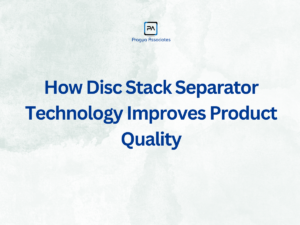Centrifugal Separators are machines that separate solid or liquid particles from a mixture based on density. As an essential component of many industrial processes, they offer several benefits over other separation methods. These devices use centrifugal force to separate two or more components of a mixture based on their density. They are commonly used in various industrial processes, including oil & gas, food & beverage, pharmaceuticals, and wastewater treatment. This blog post will examine the advantages of centrifugal separators in industrial processes.
High Separation Efficiency
One of the primary benefits of centrifugal separators is their high separation efficiency. These machines can achieve separation efficiency of up to 99%, making them ideal for applications where high purity is crucial. Centrifugal separators use centrifugal force to separate the denser particles from the less dense ones. The denser particles move towards the outer edges of the machine, while the less dense particles remain in the centre.
Centrifugal separators can achieve high separation efficiency due to the high centrifugal forces generated. These forces can exceed 5,000 times the force of gravity, which means that even small differences in density can be exploited to achieve efficient separation. It makes centrifugal separators ideal for separating fine particles or emulsions that are difficult to separate using other methods.
Industries that benefit from high separation efficiency include:
- Oil and gas: Separation of oil, gas, and water in oil drilling and production processes
- Food and beverage: Clarification of juices, oils, and fats
- Pharmaceuticals: Separation of active ingredients from impurities in drug manufacturing
Fast Separation Speed
Another benefit of centrifugal separators is their fast separation speed. These machines can separate mixtures quickly, with some models capable of processing up to 3000 gallons of fluid per minute. This speed makes centrifugal separators ideal for applications where time is critical.
Centrifugal separators can separate mixtures quickly, making them ideal for high-volume applications. They can process large volumes of fluid quickly, which is crucial in industries where time is of the essence. For example, centrifugal separators can quickly separate cream from milk in the food and beverage industry, allowing for faster processing times.
Industries that benefit from fast separation speed include:
- Wastewater treatment: Separation of solids from wastewater to reduce treatment time and increase efficiency
- Chemical processing: Separation of different components in chemical manufacturing
- Marine and shipping: Separation of water and impurities from fuel to meet environmental regulations
Versatility
Centrifugal separators are versatile machines that can separate a wide range of mixtures based on density. They can separate solids from liquids, liquids from liquids, and gases from liquids. They can handle solid and liquid-liquid mixtures, making them ideal for various applications. This versatility makes centrifugal separators ideal for various industries, including food and beverage, chemical, and pharmaceutical. Some centrifugal separators can even separate emulsions, which are difficult to separate using other methods.
Industries that benefit from the versatility of centrifugal separators include:
- Mining and minerals: Separation of minerals from ores and concentrates
- Biotechnology: Separation of proteins, DNA, and other biological materials
- Agriculture: Separation of milk, cream, and whey in dairy processing
Low Maintenance
Compared to other separation methods, centrifugal separators require less maintenance. It is mainly due to their fewer moving parts than other machines, and they don’t require any filter media or other consumables, making them easy to maintain & operate. They are less prone to clogging and require less maintenance than other separation methods. It can save businesses time and money in the long run. Centrifugal separators also have a longer lifespan than other types of machines, which can lead to cost savings over time.
Industries that benefit from low maintenance include:
- Food and beverage: Separation of solid impurities from liquid products
- Chemical processing: Separation of different components in chemical manufacturing
- Oil and gas: Separation of oil, gas, and water in oil drilling and production processes
Environmental Benefits
Centrifugal separators can also be more environmentally friendly than other separation methods. They require less energy to operate than other machines and can separate mixtures without using chemicals or filter media. It can lead to cost savings for businesses and reduce their environmental impact. For example, in the oil and gas industry, centrifugal separators can separate oil from water, reducing the amount of oil that enters the environment. It can have a significant impact on the environment and can help businesses meet their sustainability goals.
Industries that benefit from the environmental benefits of centrifugal separators include:
- Wastewater treatment: Separation of solids from wastewater to reduce treatment time and increase efficiency
- Agriculture: Separation of manure and wastewater to reduce environmental impact
- Marine and shipping: Separation of water and impurities from fuel to meet environmental regulations
In conclusion, centrifugal separators are crucial machines in many industries because they can efficiently and quickly separate mixtures with low maintenance. Their versatility and ability to handle various mixtures make them an ideal choice for many applications. Additionally, their environmental benefits make them a sustainable solution for businesses looking to reduce their environmental impact. By understanding the benefits of centrifugal separators, businesses can make informed decisions about using them in their industrial processes.
To know more about centrifugal separators read this blog: Centrifugal Separators: Working Principle, Benefits, and Applications




